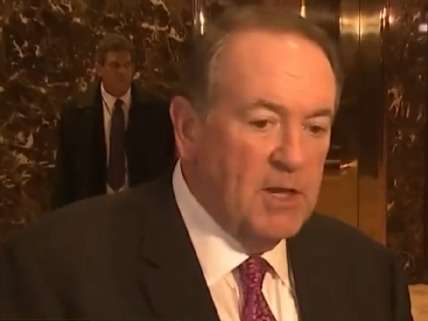National Endowment for the Arts
Think of the Children Before Scrapping the NEA, Says Mike Huckabee
The former Arkansas governor argues that federal subsidies for the arts are "essential," because creativity.

The $148 million allocated to the National Endowment for the Arts is fiscally trivial in the context of a $4 trillion federal budget. By the same token, however, the NEA is culturally trivial, a point that Mike Huckabee inadvertently makes in a Washington Post op-ed piece urging Congress to preserve the program.
"The arts are a $730 billion industry," the former Arkansas governor writes, "representing 4.2 percent of our gross domestic product—more than transportation, tourism and agriculture. The nonprofit side of the arts alone generates $135 billion in economic activity, supporting 4.1 million jobs." The NEA's budget is barely a drop in those buckets, amounting to 0.02 percent of spending on the arts and 0.1 percent of the nonprofit sector. Yet Huckabee wants us to believe the NEA "is not expendable." To the contrary, "it is essential."
Huckabee asks us to think of the children—in particular, "the kids in poverty for whom NEA programs may be their only chance to learn to play an instrument, test-drive their God-given creativity and develop a passion for those things that civilize and humanize us all." He says "they're the reason we should stop and recognize that this line item accounting for just 0.004 percent of the federal budget is not what's breaking the bank." That tiny investment generates a big return, Huckabee suggests, because "participation in the arts leads to higher grade-point averages and SAT scores, as well as improvements in math skills and spatial reasoning." He takes the issue personally because his "early interest in music and the arts became a lifeline to an education and academic success."
Even if we accept Huckabee's claims at face value, he is presenting reasons why people might choose to financially support art and music education. He does not give us a single reason why they should be forced to do so. "Distilled to its essence," George Will noted last week in the same newspaper, "the argument for the NEA is: Art is a Good Thing, therefore a government subsidy for it is a Good Deed."
Conservatives are supposed to be skeptical of such arguments, and Huckabee claims to be a conservative. "If it seems unusual that a conservative Republican would advocate for music and the arts, don't be so surprised," he says, noting that Richard Nixon and Ronald Reagan supported the NEA.
Huckabee, who briefly sought the Republican presidential nomination last year before endorsing Donald Trump, is at pains to distinguish himself from "celebrity artists" who "insult and even threaten the president." But he sounds just like Robert Redford when he suggests that being an "advocate for music and the arts" means demanding that taxpayers subsidize them. Huckabee goes even further than Redford, conflating the NEA's budget with medical progress and economic dynamism as well as "the arts." After all, Huckabee says, "creativity finds cures for diseases, creates companies such as Apple and Microsoft and, above all, makes our culture more livable." And we get all that for a mere $148 million a year—pennies per person.
Huckabee's hucksterism illustrates a much broader and more fiscally significant problem, because threatening any item in the federal budget inspires similar snake-oil salesmanship, wrapping special pleading in the public interest. "If a program is a major expense," Will observes, "its spending generates so many dependent clients that legislators flinch from eliminating or even substantially trimming it. And if a program is, like the NEA, a minor expense, legislators wonder: Why take the trouble, and experience the pain (the NEA's affluent clients fluently articulate their grievances and sense of entitlement), for a trivial gain?"
A true fiscal conservative would be embarrassed to make an argument like Huckabee's. "I'm for cutting waste and killing worthless programs," he concludes. "I'm not for cutting and killing the hope and help that come from creativity." That's right: A vote against the NEA is a vote against hope.


Show Comments (23)